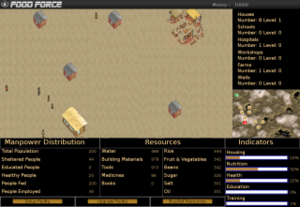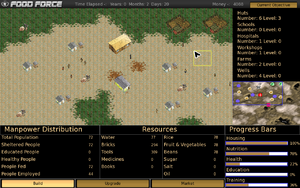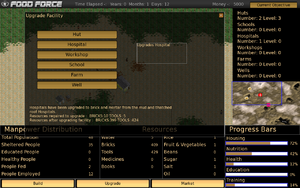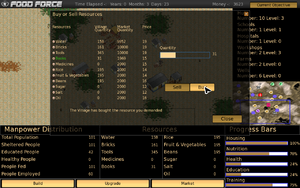Projects/foodforce2
FoodForce2
FoodForce 2 has been designed to educate and motivate people to solve world hunger. Since the laptop reaches out to the developing and third-world countries, it also educates children and teachers in a village on how to acheive self sustenance in a fun and non-intrusive way. It also provides awareness about the work WFP has been doing for the past many decades to abate the problem of world hunger.
Since an XO has limited computing power, the game has a relatively smaller footprint as compared to the first version of FoodForce and is aimed at both XOs and Windows.
Building Blocks
The basic building blocks of the game are:
- Resources
- Facilities
- Indicators
Resources
- Resources are required to setup facilities and are also consumed constantly by the people of the village.
- Resources can be traded in the market
- The price of each resource is dependent on the market forces
- The different resources present are:
- Building Material
- Tools
- Medicine
- Books
- Water
- Food : It is further divided into
- Rice
- Wheat
- Beans
- Sugar
- Salt
- Oils
Facilities
- Facilities are installations which serve the villagers.
- Resources are required for building facilities.
- Once the facilities have been built they consume certain resources for their functioning and also produce some the resources.
- Facilities can also be upgraded once they have been built.
- The different facilities present are:
- House
- Hospital
- School
- Workshop
- Farm
- Fountain
Indicators
- Indicators are a measure of the development of the village.
- The value of indicators depend on the number of facilities and their level.
- Indicators also depend on the manpower distribution of the village.
- The different indicators present are:
- Housing
- Health
- Nutrition
- Education
- Training
Game-play
The aim of the player is to make a village self-sustenant in terms of nutrition, housing, health, education and training by consistent production and trading of resources with the help of necessary infrastructure. There are three major aspects of the game:
- Construction
- Upgrading
- Trading
Construction of Facilities
- Some of the facilities like houses and hospitals are already built at the start of the game.
- Constructing new facilities such as houses, schools, workshops, farms and wells requires some resources.
- Once the facilities have been built they start producing appropriate resources and also increase the indicators.
- Facilities also affect the manpower distribution of the village by providing employment.
- Facilities also consume resources for functioning, e.g Hospitals consume medicines.
- If the village doesn't have enough resources to run a facility the facility is temporarily stopped.
- The functioning of the facility resumes when there are enough resources with the village to run it again
Upgrading Facilities
- Once a facility has been built it can be upgraded to produce more resources.
- Upgrading of facilities uses some of the resources of the village, mainly building material and tools.
- Various upgrades like brick and mortar, functional upgrades and electricity are provided for each facility.
- Every upgrade costs resources, but an upgraded facility will be more efficient and effective.
- Upgrading a facility also increases the value of the indicators
Trading of Resources
- The final cornerstone of play is trading which is crucial to a village's success.
- For trading, every village is provided with a market, which is visited by traders from neighboring villages for trade.
- The price of the resources is determined by market forces.
- A village cannot effectively grow without a smart trader, timely trades can give your village a leg-up and help it attain prosperity over time.
Implementation
The game has been implemented in Pygame using an MVC (model-view-controller) model.
The model file acts as the file which maintains the records for resources, facilities and indicators. It also maintains the record of manpower distribution.
The controller file acts as a midway between the view and the model, the controller takes the input from the user and makes appropriate changes in the model, and corresponding changes are reflected in the view.
The view file acts as the user interface all, the changes made by the controller are reflected in the view.
The files corres ponding to model, view and controller are:
- Model : model.py
- View : Foodforce2.py
- Controller : threades.py
Features
- The game has been designed in Python and Pygame and is very portable and can be run on different operating systems such as Windows, Linux and Mac.
- The game has a very small footprint and is thus easily deployed on an XO.
- The code base has been made efficient and speedy to deliver the best performance to the user.
- Extensible Design which allows easy modifications and extensions over the current game structure with total independence of Model, View and Controller.
Code Base and Status Updates
Alpha version of the game has been released. Please check the download section at : http://code.google.com/p/foodforce/downloads/list.
Relevant Files :
- FoodForce.xo : For installing on olpc. Copy the file in Activities folder and unzip.
- FoodForce for windows.zip : For installing in Windows. Unzip and run Foodforce2.exe to play the game.
- src.zip : To view the source files.
Credits
- Co-ordinator : Manusheel Gupta
- Project Manager : Deepank Gupta (deepankgupta AT gmail DOT com)
- Developer : Mohit Taneja (mohitgenii AT gmail DOT com)
- Co-Developers : Peeyush Kumar (peeyush.hsuyeep AT gmail DOT com), Vijit and Chirag
- Artwork contribution: Stefania YW, Maryam Funicelli, Silke Buhr, Federico
- Previous Contributors: Atul
Activity Summary
| Icon: | Sugar icon::Foodforce.jpg |
| Genre: | Activity genre::Games |
| Activity group: | ,|x|Activity group::x}} |
| Short description: | [[Short description::FoodForce 2 has been designed to educate and motivate people to solve world hunger by educating children and teachers in a village on how to acheive self sustenance in a fun and non-intrusive way. It also provides awareness about the work WFP has been doing for the past many decades to abate the problem of world hunger.]] |
| Description: | Description::Alpha version of the game has been released. |
| Maintainers: | ,|x|Contact person::x}} |
| Repository URL: | Source code::http://code.google.com/p/foodforce/downloads/list |
| Available languages: | ,|x|Available languages::x}} |
| Available languages (codes): | ,|x|Language code::x}} |
| Pootle URL: | |
| Related projects: | Related projects,|x|Related projects::x}} |
| Contributors: | ,|x|Team member::x}} |
| URL from which to download the latest .xo bundle | Activity bundle::http://code.google.com/p/foodforce/downloads/list |
| Last tested version number: | Activity version::0.4 |
| The releases with which this version of the activity has been tested. | ,|x|Software release::x}} |
| Development status: | Devel status::3. Alpha |
| Ready for testing (development has progressed to the point where testers should try it out): | ,|x|Ready for testing::x}} |
| smoke tested : | |
| test plan available : | |
| test plan executed : | |
| developer response to testing : |
| URL from which to download the last .xo bundle that works with old releases | Activity bundle::http://code.google.com/p/foodforce/downloads/list |
| Activity version number: | Activity version::0.4 |
| The releases with which this version of the activity has been tested. | ,|x|Software release::x}} |
| Development status: | Devel status::3. Alpha |




